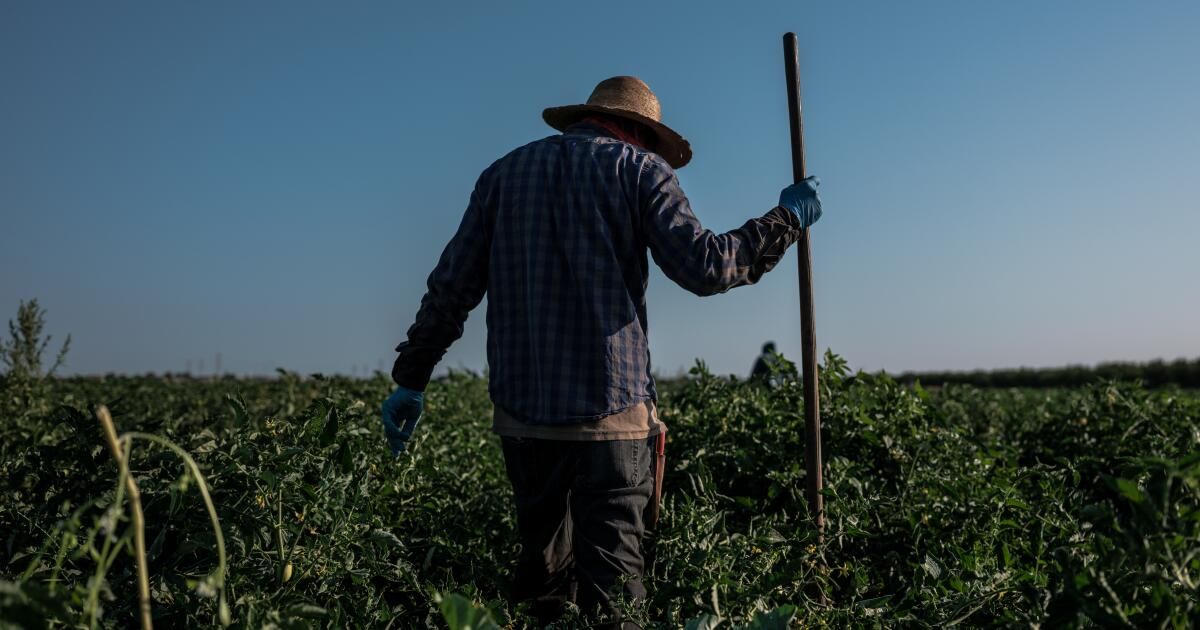After more than a month of deliberation, a Kern County Superior Court judge has sided with Wonderful Co. and issued a preliminary injunction that will temporarily halt a contentious bargaining process between the agricultural giant and the state’s largest farmworker union.
In a ruling issued Thursday, Judge Bernard C. Barmann said Wonderful would “likely prevail” in its legal challenge to the state’s relatively new system for organizing farm workers and faced irreparable harm if the United Farm Workers union is allowed to seek a bargaining agreement on behalf of the company’s nursery workers before the case is decided.
“The court finds that the public interest weighs in favor of a preliminary injunction, given the constitutional rights at stake in this matter,” Barmann wrote in the 21-page decision. Wonderful “has complied with its obligation to issue a preliminary injunction until the matter can be heard in its entirety on the merits.”
Wonderful, the $6 billion agricultural powerhouse owned by Stewart and Lynda Resnick, sued the state Agricultural Labor Relations Board in May, challenging the constitutionality of the state’s so-called card-check system, which Gov. Gavin Newsom signed into law in 2022. Under its provisions, a union can organize farmworkers by inviting them to sign authorization cards at off-site meetings — without notifying an employer — rather than voting by secret ballot at a designated polling place.
Union organizers had pushed for a revision of the card check law, arguing that the secret ballot process left workers fearful of retaliation from their employer.
But Wonderful, whose portfolio includes such well-known brands as FIJI Water and POM Wonderful, alleges in its lawsuit that the law deprives employers of due process on multiple fronts. Among them: forcing a company to sign a collective bargaining agreement even if it has formally appealed the ALRB’s certification of a union vote and has presented what it believes is evidence that the voting process was fraudulent.
The injunction marks the latest turn in a tumultuous dispute over the UFW's unionization drive at Wonderful Nurseries in Wasco, the nation's largest grapevine nursery.
In late February, the UFW filed a petition with the labor relations board, claiming that most of the nursery's more than 600 farm workers had signed authorization cards and requesting that the UFW be certified as their union representative.
Within days, Wonderful accused the UFW of tricking farmworkers into signing authorization cards under the guise of helping them apply for $600 in federal aid for farmworkers working during the pandemic. And the company submitted nearly 150 signed statements from nursery workers saying they didn’t understand that by signing the cards they were voting to unionize.
The UFW responded that Wonderful had intimidated workers into making false statements and had hired a labor consultant with a reputation for union-busting to manipulate their emotions in the weeks that followed.
The ALRB acknowledged receiving the Wonderful workers' statements; however, the labor board's regional director moved three days later to certify the union's petition. In subsequent hearings, she said she felt she had to act quickly under the timeline set out in the card check law, and that at the time she did not believe the statute authorized her to investigate the allegations of misconduct.
Wonderful appealed the ALRB certification.
Under the provisions of the card check law, the UFW’s efforts to negotiate with the company on behalf of its daycare workers would continue even as Wonderful’s appeal for certification made its way through the ALRB’s administrative hearing process. The ALRB issued a ruling last week ordering Wonderful to enter into a mandatory mediation process with the union to establish a collective bargaining agreement.
In its lawsuit, filed in May, Wonderful challenges the constitutionality of the card-check system on multiple fronts. Among them: that the company's due process rights were violated when the labor board sought to certify the UFW petition before investigating the company's allegations that the vote was fraudulent; and, more broadly, that the card-check system does not have adequate safeguards in place to ensure the truthfulness of the voting process.
The company asked the judge to halt the unionization effort at its nursery, as well as the ALRB's administrative hearing process regarding the company's appeal, while the lawsuit moved forward in Kern County court.
In a statement released Thursday evening, Rob Yraceburu, president of Wonderful Nurseries, said the company was “pleased” by the court’s decision to pause the certification process until the constitutionality of the card check law can be “fully and properly considered.”
“Furthermore,” Yraceburu said, “farmworkers have been unfairly prohibited from opposing the imposition of a union on them, and this ruling establishes that Wonderful does indeed have the standing to fight to ensure that those constitutional rights of farmworkers, including their due process and First Amendment rights, are not violated.”
UFW spokeswoman Elizabeth Strater responded that the ruling “ignores 89 years of labor law precedent” and said the decision to grant the injunction would be appealed.
“There is already a process in place to address election irregularities and Wonderful was in the middle of that process. Why does Wonderful want to stop that process and silence workers so their voices are not heard?” Strater said. “It is very clear that Wonderful is determined to use its considerable resources to deny farmworkers their rights.”
In a May 30 filing, the state had urged the court to deny Wonderful’s request for an injunction. California Attorney General Rob Bonta, arguing on behalf of the ALRB, said Wonderful had failed to show that the card check law was causing “irreparable harm or any likelihood of deprivation of her rights.” Bonta also argued that the Superior Court lacked jurisdiction in the case.
Santiago Ávila-Gómez, executive secretary of the ALRB, said Thursday night that the agency is “reviewing the ruling carefully and will have no further comment at this time.”
Meanwhile, the UFW is pursuing its own legal action against Wonderful. The union has filed a formal unfair labor practice complaint with the ALRB, accusing Wonderful of forcing workers to attend “captive audience” meetings to urge employees to reject UFW representation. ALRB General Counsel Julia Montgomery filed a complaint in April, similar to an indictment, alleging that Wonderful committed unfair labor practices by illegally helping them draft statements to revoke their authorization cards.
The company has largely denied the allegations.
This article is part of The Times article. Equity Information Initiative, funded by the James Irvine Foundationexploring the challenges faced by low-income workers and the efforts being made to address them. California's economic divide.












